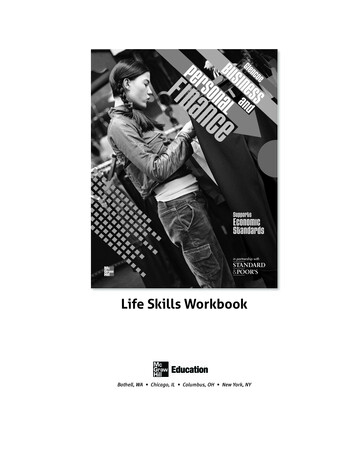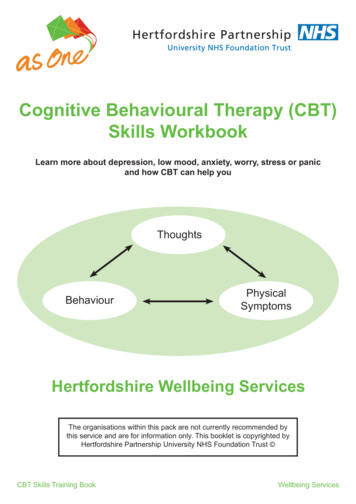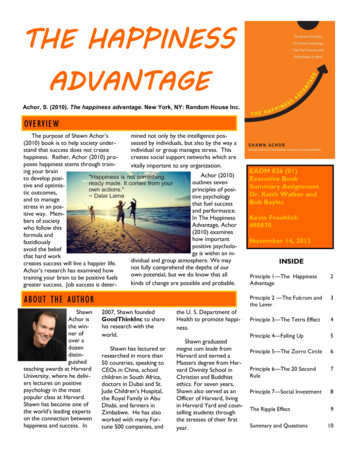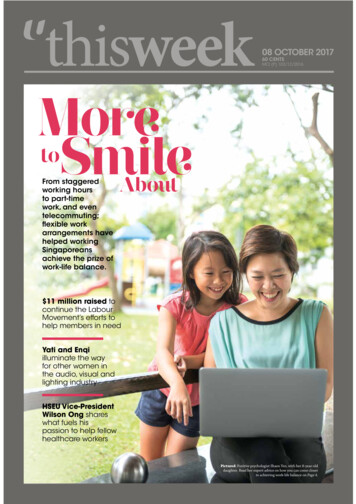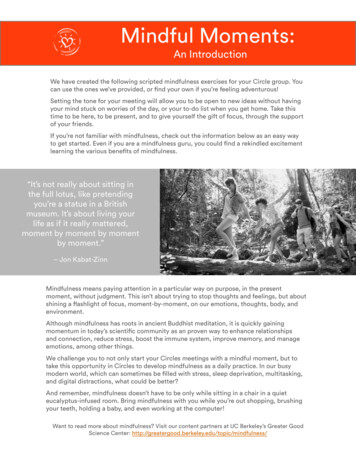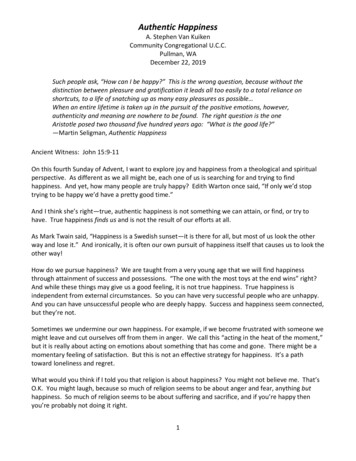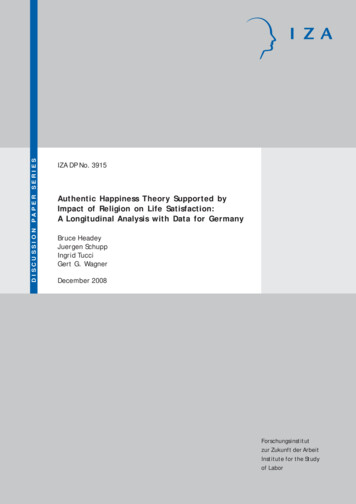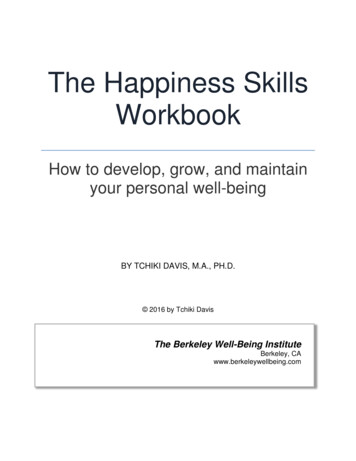
Transcription
The Happiness SkillsWorkbookHow to develop, grow, and maintainyour personal well-beingBY TCHIKI DAVIS, M.A., PH.D. 2016 by Tchiki DavisThe Berkeley Well-Being InstituteBerkeley, CAwww.berkeleywellbeing.com
ContentsFREE PREVIEWINTRODUCTION .41. HAPPINESS ASSESSMENT .62. HAPPINESS DEFINITIONS .73. HAPPINESS BELIEFS 12END PREVIEWThe activities below are included in the Full eBook, which can bepurchased here: http://www.berkeleywellbeing.com/store4. MENTAL TIME TRAVEL .175. HAPPINESS VALUES . .196. PRIORITIZING POSITIVITY .237. EMOTIONAL MEMORY .268. EMOTIONAL ATTENTION .289. SAVORING .2910. BEST POSSIBLE SELF 3111. GOALS 3212. SELF-COMPASSION 3413. POSITIVE PERSONALITY TRAITS .36Berkeley Well-Being Institute The Happiness Skills Workbook2
14. IDENTIFYING PERSONAL STRENGTHS 4015. SEIZING OPPORTUNITY 4116. HEALTHY EMOTIONAL PROCESSES .4217. MINDFULNESS MEDITATION 4518. STOPPING UNHEALTHY EMOTIONAL PROCESSES .4619. EMOTION REGULATION 5220. RESILIENCE AND BENEFIT FINDING .5421. GRATITUDE LIST .5622. GRATITUDE LETTER .5723. ALTRUISM .5824. ACTS OF KINDNESS .6025. EMPATHY .6326. ACTIVE LISTENING .6527. ASSERTIVENESS .6628. REFLECTING ON PROGRESS .6929. CUSTOMIZING YOUR HAPPINESS PLAN .8130. CREATING YOUR HAPPINESS PLAN .8531. COMMITTING TO HAPPINESS .8632. FINAL ASSESSMENT .87CONCLUSION .88Berkeley Well-Being Institute The Happiness Skills Workbook3
IntroductionWhat is the science behind this workshop?This workbook is based on The Berkeley Method for Well-Being. TheBerkeley Method of Well-Being is a unique blend of scientifically-supportedactivities shown to improve mental health and well-being. It is drawn fromdiscoveries in the fields of positive psychology, emotion science, clinicalpsychology, and neuroscience - discoveries that each offer unique insightsinto the science of improving the human condition.A seminal aspect of the method is the emphasis on translating discoveriesfrom these fields into experiential learning activities. Therefore, in additionto integrating well-being research across different fields, this method reliesupon science-based pedagogical approaches that enhance studentlearning, motivation, and engagement.How does scientific research inform this workbook? You will notice that this workbook involves very little informationdirectly teaching you about happiness. This is because research hasshown that people learn better through experiences. This is why mostof the knowledge you will gain from this workbook will be throughengaging in practice activities, self-exploration, and critical thinking. The activities you will engage in have been specially selected. Theycover a broad range of skills and happiness dimensions. Some maybe more fun; others may be more challenging. Just keep in mind thateach of these activities is based on peer-reviewed empirical researchand each one is designed to increase happiness. Although you will likely experience a happiness boost after thiscompleting this short workbook, keep in mind that you must continuedoing these types of activities to maintain your happiness. If youwanted to get physically healthy, you would have to keep exercisingand eating right. Happiness works in a very similar way. This workbook focuses on happiness, well-being, and thriving.Although these skills are often helpful for individuals with more severeBerkeley Well-Being Institute The Happiness Skills Workbook4
mental health issues, they should not replace professional guidancefrom a trained therapist. The information is intended for general use,and not intended to diagnose, treat or prevent any disease/condition.For more information, please keley Well-Being Institute The Happiness Skills Workbook5
OverviewThis workbook includes a wide selection of activities designed to help youbetter understand and increase your own happiness. These activities are inthe following formats. Activities (e.g., quizzes and writing assignments)o These will help you learn about and practice using happinessskills. Notes, Reflections, and Questionso Throughout this workbook, you will see boxes that are labeled“notes, reflections, and questions”. These boxes are for you towrite down anything you think of during the course that youdon’t want to forget. Dashed boxeso Throughout the workbook, you will see boxes that have adashed outline with a scissors picture. These sections are thekey take-aways. If you choose, you can cut them out and keepthem handy.Berkeley Well-Being Institute The Happiness Skills Workbook6
Happiness AssessmentWhat is your happiness starting point?We have developed and validated an assessment to measure 20happiness skills. Before you begin, please take a few minutes to take thesurvey online. .htmlBy doing so, you will get a better understanding of the different happinessskills, you will learn about your strengths and weaknesses, and you cantrack your progress.Notes & Reflections on your scores: What happiness skills are yourstrengths? What are your weaknesses? What skills do you most want toimprove? Keep these answers in mind as you complete the next activities.Berkeley Well-Being Institute The Happiness Skills Workbook7
What is Happiness?PART 1What is happiness?Rate how much you believe each of the following dimensions contribute toyour happiness. These are just some of the many skills that can contributeto happiness, so you will have the opportunity to add more skills in the nextactivity. Remember, everyone is different and there are no wrong answers.How much do these skills contribute to your happiness?Self-awareness: The ability to attend to and acknowledge thoughts,emotions, and --5not at alla little bitsomewhata lottonsSelf-regulation: The ability to control and manage thoughts, emotions, -----5not at alla little bitsomewhata lottonsGratitude: The tendency to be thankful for people, experiences, and things,and to show appreciation for the kindness of not at alla little bitsomewhata lottonsEmpathy: The ability to understand and share the feelings of ------5not at alla little bitsomewhata lottonsAssertiveness: The ability to be self-assured in advocating for your ownneeds.Berkeley Well-Being Institute The Happiness Skills Workbook8
------------------4-----------------------5not at alla little bitsomewhata lottonsResilience: The capacity to cope with or recover quickly from --------5not at alla little bitsomewhata lottonsPositive Thinking: The capacity to have attitudes that focus on the brightside of not at alla little bitsomewhata lottonsDecision Making: The ability to easily make important decisions and followthrough with t at alla little bitsomewhata lottonsSocial Skills: The ability to interact and communicate with others ineffective and successful t at alla little bitsomewhata lottonsWhich 3 dimensions above most contribute to your happiness?1.2.3.Berkeley Well-Being Institute The Happiness Skills Workbook9
What is Happiness?PART 2What is happiness?In addition to the dimensions of happiness just described, there are manymore dimensions of happiness, some of which may be very important toyou. Below, please list and describe 4 additional happiness dimensions.For each one, please describe it and rate how much it contributes to yourhappiness.Features of my happiness:1.2.3.4.Feature 1:Definition:How much does this contribute to my --5not at alla little bitsomewhata lottonsBerkeley Well-Being Institute The Happiness Skills Workbook10
Feature 2:Definition:How much does this contribute to my --5not at alla little bitsomewhata lottonsFeature 3:Definition:How much does this contribute to my --5not at alla little bitsomewhata lottonsFeature 4:Definition:How much does this contribute to my --5not at alla little bitsomewhata lottonsBerkeley Well-Being Institute The Happiness Skills Workbook11
What are Your Happiness Beliefs?PART 1What are your happiness beliefs?Please rate the following questions:I can't control my -5not at all truea little bit truesomewhat truea lot trueextremely trueI can't really improve my ability to change my -5not at all truea little bit truesomewhat truea lot trueextremely trueEven when I try, I can't really change the emotions that I t at all truea little bit truesomewhat truea lot trueextremely trueAdd up your score. My score isWe will come back to this score later.Berkeley Well-Being Institute The Happiness Skills Workbook12
What are Your Happiness Beliefs?PART 2What are your beliefs about learning?Please rate the following questions:I can't learn new things (for example, riding a ot at all truea little bit truesomewhat truea lot trueextremely trueI can't learn math (for example, addition and -----5not at all truea little bit truesomewhat truea lot trueextremely trueI can’t learn a new skill even when I try my 5not at all truea little bit truesomewhat truea lot trueextremely trueAdd up your score. My score isWe will come back to this score later.Berkeley Well-Being Institute The Happiness Skills Workbook13
What are Your Happiness Beliefs?PART 3Take a few moments to think about a time you learned something that wasdifficult. Maybe you learned calculus. Maybe you learned to do a back flip.Or maybe you learned how to build a house.Feel free to make notes on your experiences and anything you learnedfrom others to better understand your learning style.One time I learned something difficult was:Berkeley Well-Being Institute The Happiness Skills Workbook14
What are Your Happiness Beliefs?PART 4Now, describe a time you learned a happiness skill. This is a little trickierbecause we aren't accustomed to thinking about happiness in this way.Feel free to make notes on your experiences and anything you learnedfrom others to better understand your happiness learning style.One time I learned a happiness skill was:Berkeley Well-Being Institute The Happiness Skills Workbook15
What are Your Happiness Beliefs?PART 5What are your happiness beliefs?Please rate the following questions:I can't control my -5not at all truea little bit truesomewhat truea lot trueextremely trueI can't really improve my ability to change my -5not at all truea little bit truesomewhat truea lot trueextremely trueEven when I try, I can't really change the emotions that I t at all truea little bit truesomewhat truea lot trueextremely trueAdd up your score. My score isDid your score change? Do you feel more able to change and growyour happiness skills?Berkeley Well-Being Institute The Happiness Skills Workbook16
Now that you know that happiness is a skill that can be learned, take a fewmoments to reflect on any happiness beliefs that you think may bepreventing you from optimizing your happiness.Remember: You can really improve your ability to control and change youremotions. All it takes is effort.Notes & Reflections:Berkeley Well-Being Institute The Happiness Skills Workbook17
You’ve reached the end of this freepreview. I hope you enjoyed it!If you want to learn more happiness skills, the Full eBook can bepurchased here: http://www.berkeleywellbeing.com/storeIf you enjoyed this workbook, you may also enjoy these:Store: http://
Berkeley Well-Being Institute The Happiness Skills Workbook 17 Now that you know that happiness is a skill that can be learned, take a few moments to reflect on any happiness beliefs that you think may be preventing you from optimizing your happiness. Remember: You can really improve your ability to control and change your emotions. All it .

